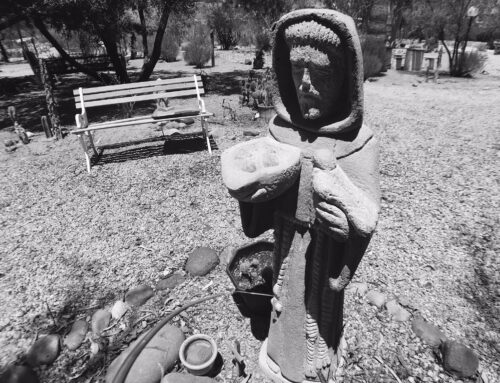Like many church professionals, I have more than one income stream. Half of my time I’m a worship pastor at a Vineyard church, and the other half I’m a team leader at a humanitarian anti-hunger organization which is doing some great things in addressing global hunger. While schedule-wise, I need to watch my time allocation so that my family doesn’t go crazy (as well as for my own sanity), right now I’m blessed that I get to live out my calling in this way. What I mean by ‘calling’ is the re-occurring theme in my life that I’ve been pursuing and endeavoring to live out for most of my life: the reality that worship, prayer, and cultivating an intimacy with God naturally results in a life that ministers to the poor, broken, oppressed, and marginalized of society.
Now, I usually don’t post about being a worship leader. Maybe I’m a bit intimidated. There is whole world of thought about worship: the self-proclaimed worship nerds, the critical worship pet-peeve internet posters, and, of course, the analysis of current trends. There are many people who have been in the game much longer than my 20+ years, whom I highly respect. I don’t want to add to any white noise, and maybe this won’t even be given a bit of attention (I’m cool with that), but I’m going to say it. Just a few thoughts.
Worship is so much more than preference, style, and singing. True, your worship (music) experience may not be perfect, because worship leaders aren’t perfect. In the best case, they (we) are just imperfect people, leading imperfect people in worship of a perfect God. And perhaps, in the worst case, they (we) are just broken people unaware of their brokenness, looking to express their hunger for God though it may be tainted by their need for validation, hunger for attention, and narcissism. The struggle is real. My experience is not that I’m somewhere in that spectrum, but rather, within my humanity, I am that spectrum. And the more I grow in Christ, the more of a ragamuffin I identify myself as, because I believe an important part of worshipping God in spirit and truth is to be true about your own condition: broken people needing the Grace of a gracious and merciful God. One of my favorite authors, Brennan Manning wrote, “To live by grace means to acknowledge my whole life story, the light side and the dark. In admitting my shadow side I learn who I am and what God’s grace means.” A want to be a follower of Jesus, a worshipper of Jesus, and worship leader who lives by grace. I believe that to surrender ourselves to Christ is to surrender everything: our true selves, yes, but even more importantly our false selves, because without doing that we’ll never find our true selves. Another Manning-ism that has become foundational to me is: “Define yourself radically as one beloved by God. This is the true self. Every other identity is illusion.” My dream is that everyone would leave the church every week, knowing (really knowing) that they are beloved by God. Not just loved, because I believe our cultural concept of love has made it difficult for us to understand the agape Love of God. But to be beloved, dearly admired, is identity: an identity not rooted in what we do or don’t do, but in who God is, and who He says we are. Regularly, my prayer for us is: “that Christ may dwell in your hearts through faith—that you, being rooted and grounded in love, may have the strength to comprehend with all the saints what is the breadth and length and height and depth, and to know the love of Christ that surpasses knowledge, that you may be filled with all the fullness of God.”
With all that said, I feel like I need to say this to my worship leading community who might stumble on my humble blog as well as to the worshipers whom I lead.
The weekend worship time is approached prayerfully and with awareness of the Body.
While everybody has their different approaches and mentalities to a weekend service, the best thing I was taught was approaching it from a servant-leader mentality: opting for room engagement over the hippest and newest. It’s not about being cool, it’s about connection. An accessible new song in the mix can really help add to that connection, true, but too many unknown songs can take it away. I know ‘room engagement’ seems subjective, but some of what I do to prepare for room engagement is:
- I pray for you. I really do. As I pray about the set for the weekend, I’m praying for you and your week. Because, for me, it’s not about the tunes, it’s about experiencing God together.
- Staying away from fluff. I believe the music needs to accurately reflect who God is and our relationship to Him since worship is the very engagement of that relationship. I have a passion for the Word of God, and that worship would be saturated with how He has revealed Himself to us and the response of that.
- We need to live what we sing. Considering this, I try to intentionally pick songs not only for intimate heart connection (songs that sing to God and not just about God), but also for Kingdom-living intentionality. Not only “Our Father,” but also, “Thy Kingdom come, Thy will be done.” The words that we sing must go beyond sentimentality, they must bring intentionality.
- For me, it’s also about releasing others in their calling. I want to raise up the next generation as worshippers and worship leaders. That’s how I was raised up, that’s how I’ll raise others up, and I believe it will continue in that cycle. It’s called discipleship. What this means is that it’s my heart to have multi-generational teams on the platform. Sometimes it might not always be pretty, but it’s worth it. It might mean more time in practice, spending time teaching musical skills and dynamics of being a team, and addressing and readdressing values. However, the direction of my life was largely influenced by the worship leaders and pastors who did this for me.
Now, there’s other things too: like, gradually introducing new songs so that they become known, and picking singable keys, but those are kind of hacks next to these values.
The weekend worship time cannot be the main event. The week must be.
I want to stress this: I’m not just a dude on stage with a guitar. I want to live my life saturated in worship (not just music and not just a church building), and I hope that maybe even in my imperfect expression of this, it would be an encouragement to the congregation. I find quotes like the following powerful, and important for the Body to experience and understand:
“If we serve Jesus then every act and thought has meaning. Acts of kindness aren’t just niceties, they become acts of worship.” John Wimber
and…
“Let us practice the fine art of making every work a priestly ministration. Let us believe that God is in all our simple deeds and learn to find Him there.” A. W. Tozer
I believe if you want a greater experience of the presence of God in corporate worship, then:
- Be on mission together: serving the Last, the Lost and the Least, the poor, the oppressed and the outcast – together. Volunteer together, serve together, take risks together.
- Love one another: don’t gossip, learn to love, work through differences (Matthew 18). Yup, easier said than done.
- Pursue God together: share the journey of experiencing God together.
If you want an awesome corporate worship experience this weekend, posture yourself to experience God during the week. Learn the fine art of finding God in the simple deeds, and let that shine through in the weekend service. I’m hungry for the body to experience Jesus throughout the week, and that our time on Sunday would be a time of beloved, imperfect people, crying out and hungry for a holy, unfathomable, and incomprehensibly loving God.





